This interview done by the British survival and bush craft expert Nick Gallop was made 2010. I have made some additions to his original. Do read the original article here and do notice that Nick has a lot of knowledge and there´s plenty of good reading.
When travelling in the backcountry for more than a week or two, carrying enough food becomes a problem. What happens then? Should you consider hunting, fishing or foraging for extra calories or can you resupply en-route? As food is one of our most basic needs, extended periods with limited food can alter our thinking forever. Decisions made when planning an expedition can also have serious consequences later on and could mean the difference between life and death.
I asked the explorer Mikael Strandberg how he approaches this. An adventurous soul, he’s undertaken some very interesting and hard expeditions focusing on making connections with people and understanding other cultures.
Writing about his 2004-2005 expedition in Siberia, Mikael said “After having survived mainly on moose meat and raw, frozen fish during most of the winter, we nearly cried when we came across big plates of fried reindeer brain and cooked bone marrow. At that stage, I suddenly realised, after spending 23 years of exploring extreme parts of our world and trying to understand the meaning of life, from now on, I’ll stop thinking about the big worrisome issues and simply concentrate on the uncomplicated ones. Like the thought of some more cooked bone marrow”.
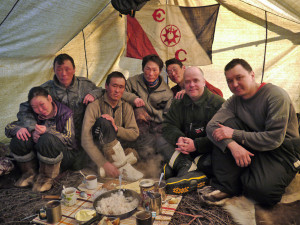
Mikael, on long, man-powered expeditions like yours what problems do you have getting enough calories and nutrition?
It depends where I am doing the expedition. In Yemen for example, in the Al Mahra desert, it was hard to find food. So we carried as much as we could on a camel, but it had its limits, so we ate the traditional soups, we came across people most nights, who invited us to dinner consisting of bread, rice and onion, but I always, for me easy and a good excuse, put on a lot of weight before I set off. At least 25 pounds and most of the time, not always, it is all gone at the end. This is one very important thing, put on extra weight!
I noticed the kit list for your 2004-2005 expedition along the Kolyma river in Siberia included the following items:
- 1 Rifle, Blaser R90 Off-Road with .3006-pipe [barrel]
• Telescopic sight
• Extra ammunition holders
• 1 Cleaning kit
• 2 Fishing rods
• 60 bullets, lead .3006
• A Couple of baits and wobblers
• Extra line, flies, casting balls
• Float, hooks
• Landing net
• Fishing net
Being Swedish, I’d guess that hunting and fishing is very natural to you but I have a feeling many people in the UK might not think of taking this kind of hardware – especially a firearm. How did carrying it change the expedition?
Lots of fresh, nutritious food! (My answer back in 2010, which is right) Today, 2014, I wouldn´t bring a gun. I would fish only.
What tips do you have for anyone planning such an expedition when they’re thinking about food?
One needs to add on a few extra kilos before leaving, maybe not 26 like I did before the Siberian expedition but quite a few because you will lose lots of weight! Most of the time, one is really, really tired, so there´s little energy to either fish or hunt or do any complicated meals, so bring lots of freeze dried food, but with some tasty food once or twice a week like dried moose fillet. I recommend REAL FOOD when it comes to freeze dried food. Tasty and filling! (I agree with this still today)
Did carrying a firearm cause you any problems?
In Siberia, on and off, the authorities thought we were hired guns, mercenaries and/or snipers!
Was the time for food gathering included in your plans? – how did finding food fit in with the objectives of the expedition?
We only fished and hunted for three months before the arrival of winter. Hunting and fishing is also part of who we are, so it was fulfilling work!
When planning the expedition did you have any idea how much food you could get by hunting and fishing? Were your ideas right?
No. It was much more difficult than I thought! A typhoon moved in the second day. We didn’t get anything for the first month!
What did you have for food when winter arrived?
Stroganina [a dish made from long thin slices of various frozen Arctic river fish] and dried and frozen fresh food like fish and moose.
What’s your favorite expedition food?
Dried moose heart. Dried fish, like stroganina. Yummy!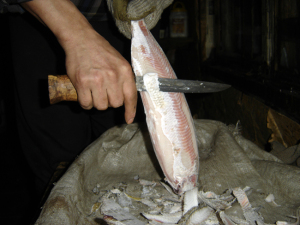
It’s very easy to pack some simple, lightweight fishing kit and simple hunting kit. Do you think the time invested in learning to use these effectively will be worth it?
Hunting should be efficient and the game shouldn’t suffer unnecessarily. Always shoot to kill the easiest way, e.g the heart. Fishing, sure, but it is harder. Better to bring a net.
If you could carry one hunting or fishing item on expedition what would it be and why?
A knife. Well, it is the most vital item. You can do pretty much everything with it!
As you know I’m very interested in the connections we can make with indigenous people through the use of primitive skills. If we learned about wild food and hunted, fished and foraged on our expedition how would it change our relationship to the people we meet along the way?
Good question! It would make a dramatic difference, since getting to know local people, indigenous or not, you need to have some very close things to associate with to open the door to their hearts, hunting and fishing is part of their lives.
How do expedition food choices affect the environment?
It depends where. In Siberia, hunting and fishing in a proper way does no harm but otherwise, buy local food. This is of course, helping the local economy. So buy locally if possible.
What’s the worst thing you’re ever had to eat on an expedition?
Well, drinking raw blood with the maasai wasn’t a hit, I can tell you that! Basically due to the heat and other surrounding smells like urine. I’m also not a fan of tree slugs in Congo! And my friend Dogan Tlilic’s iskembe soup, I am not big on tripe in soups!
Have your food experiences while on expedition changed your thinking on how we treat food back in Europe?
Being brought up in the countryside and forest, hunting and fishing has been part of my grown up life. So Siberia taught me to take care of every single part of the animal, including the muzzle of a moose and their brains.
Mikael, thanks very much for a great insight into life at the sharp end of expedition catering!
*Original article can be found at http://www.skillsforwildlives.com/2010/06/expedition-food-an-interview-with-mikael-strandberg/
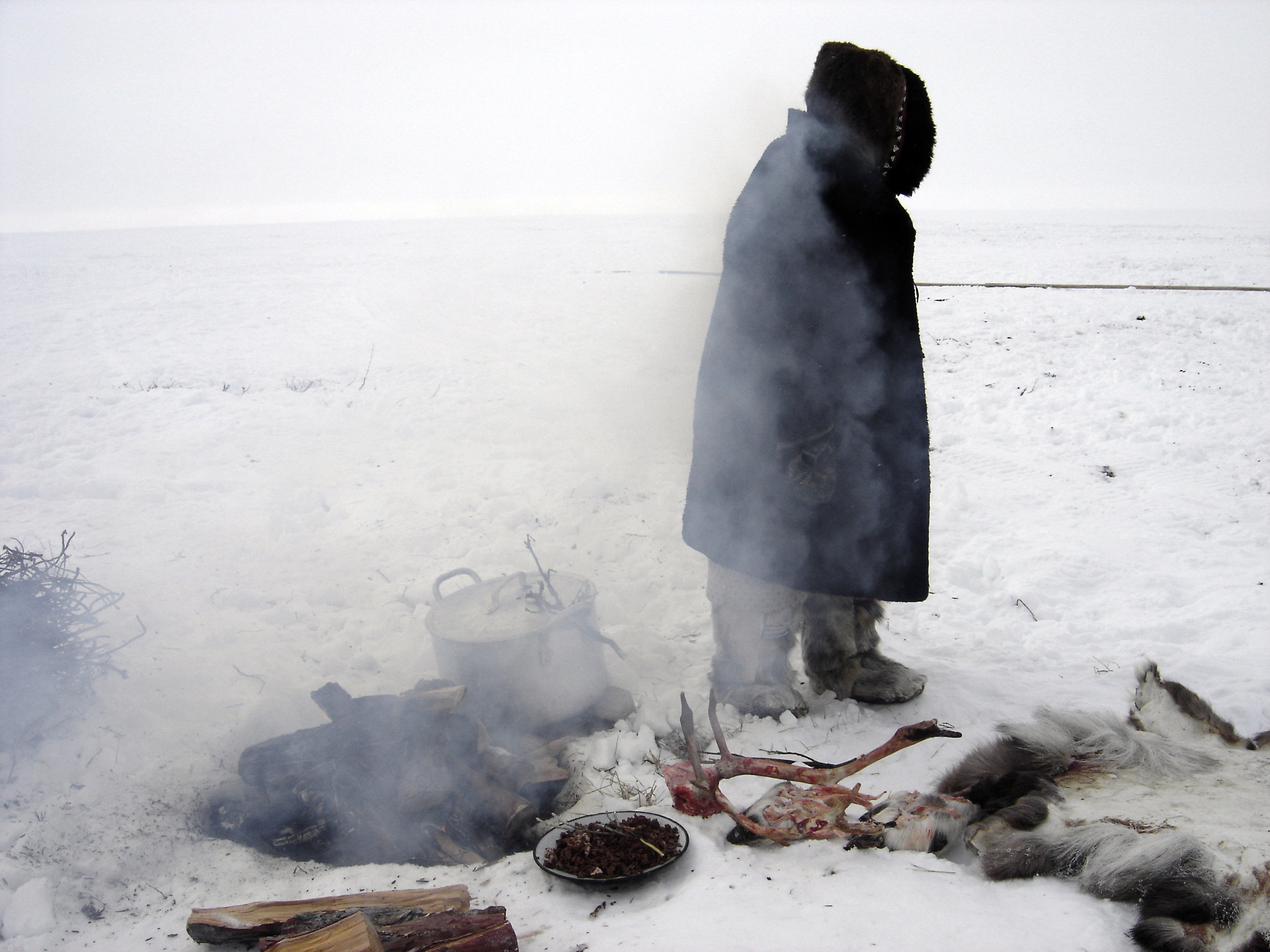
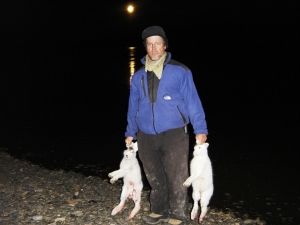

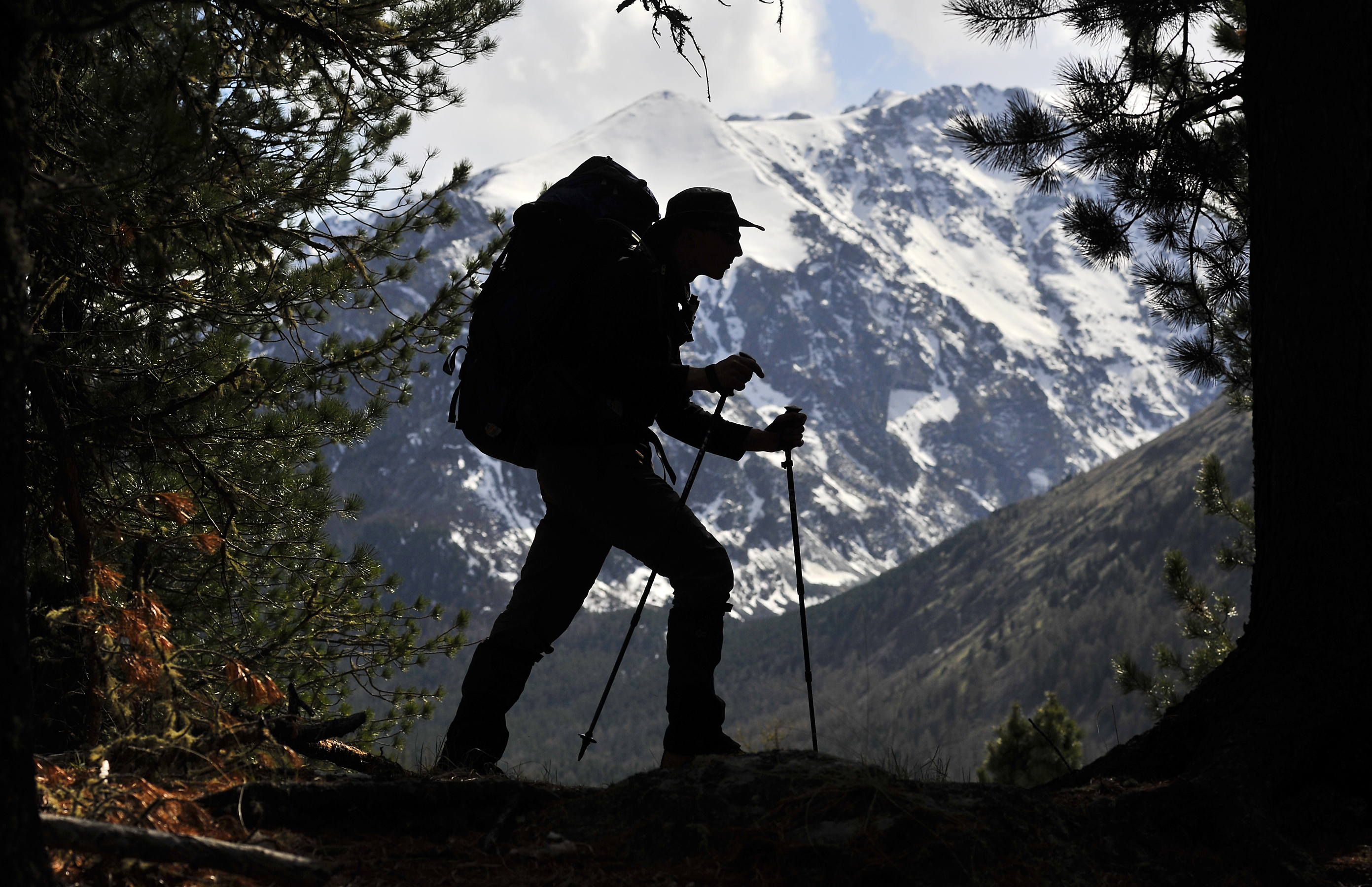
hi, my name is Caelan Crockett! right now, you are my idol and I aim to become the explorer of this generation. now I know that’s big talk for a little guy like me but I have a dream that could be a catalyst for something great. but first, let me describe a little about myself. I am 16 years old and am considered wise amongst my friends. I LOVE desserts, candy, and cavity giving deliouciosness (I spelled that wrong on purpose) (haha not really) I currently have a crush on my best friend(probably more than just a crush), and I intend to be something the world will remember, something special, someone people can look up to and not down on. that’s not everything about me but it might give you an idea about me. so, anyway, my dream is to become a world class explorer, but im not sure where to start, how to start, what to do… how can I make exploring a career like you have? what I want to do the most is once I have enough experience exploring and enough moolah, I’ll create an organization that will pay passionate explorers like you and I to explore designated uncharted spots and bring back info. I read one of your entries on your website you posted a couple years ago and you said “the world will never be fully explored” (or.. something like that) but I disagree. I’m curious that I can prove you wrong